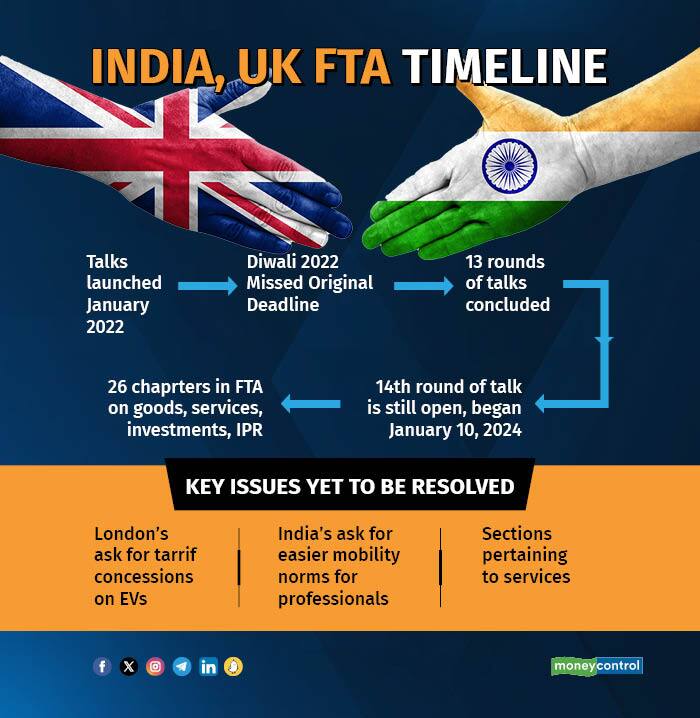



United Kingdom's (UK) Prime Minister Rishi Sunak surprised everyone by declaring elections as early as July 4. A regime change is widely expected, with the opposition Labour Party seen as the frontrunner.
Does that alter the fate of the ongoing negotiations for a free trade agreement (FTA) between the UK and India? According to experts, given that a trade deal with India will give British products easier access to a high-tariff market, it's a sensible move for whichever party that comes to power to clinch the pact sooner rather than later.
Aided by lower tariffs, the proposed FTA with India is expected to help the UK increase the export of chemicals, transportation equipment, electric and hybrid motor vehicles, and whisky, among others. While, labour-intensive Indian exports such as textiles and footwear may benefit from lower British duties.
“As we have seen, Sunak’s Conservative government has prioritised India-UK relations, including the FTA. From the UK India Business Council’s (UKIBC) discussions with the Labour party and from their public statements, we know that they also recognise the importance of India and are committed to concluding successful, win-win, FTA negotiations. So, regardless of who wins the election, we fully expect the UK-India relationship to be positive and increasingly close,” Richard McCallum, Group CEO, UKIBC told Moneycontrol.
Latest opinion polls in the British media suggest that Sunak’s Conservative party is a long way behind its main rival, the Labour party, which is clocking above 40 percent in the polls.
Ajay Srivastava, Founder, Global Trade Research Initiative (GTRI), agrees. “If they (UK) are smart, they will sign the FTA soon and engage for an expansion, like Australia,” he said.
Srivastava is referring to the wider Comprehensive Economic Cooperation Agreement, or CECA, being negotiated currently after an India-Australia Economic Cooperation and Trade Agreement (ECTA) was inked in April 2022.
The FTA between India and the UK, originally slated to be signed in Diwali 2022, is yet to be clinched as the two sides continue to negotiate on a few unresolved issues, including rules of origin, London’s demand for tariff concessions on electric vehicles, and norms about services. There are 26 chapters in the agreement, which include goods, services, investments, and intellectual property rights.
Both sides are also looking to iron out disagreements over New Delhi seeking easier mobility norms for its services industry.

India's commerce ministry, on May 15, said that chapter-wise negotiations for the proposed trade pact are nearly closed and the schedule on goods and services are at an advanced stage of talks. The Indian team visited the UK on April 16-19, aiming to resolve outstanding issues.
More delays?
There are worries that early elections in Britain could further delay the signing of the trade deal.
But McCallum believes that early elections in the UK are positive for the negotiations. “It means that by early July, both the UK and Indian governments will have fresh mandates, which will allow negotiations to resume quickly and with purpose,” he explained.
Another expert, who spoke on condition of anonymity, explained why snap polls in Britain are not necessarily negative for the FTA talks. The timing of of the UK polls shrinks the period of confusion for both nations, and talks can pick up between the two new governments sooner.
“If the UK polls happened even as early as October, that would elongate the period of uncertainty, given that negotiations on policies such as trade deals with other nations tend to slow down when a country is preparing for elections. If the Labour party comes to power, they too are expected to consider the FTA on priority,'' this person said.
Britain was mandated to hold general elections before January 2025.
Shifting goal posts
Currently, Indian officials indicate that they have pivoted from the approach of having a hard deadline to ink the FTA.
This shift apparently comes after missing several internal deadlines that were said to be targeted by India with the latest one aiming to wrap up talks for the deal within 100 days of the new government taking charge in New Delhi after the conclusion of the ongoing Lok Sabha polls.
The Centre's 100-day agenda is a plan that outlines the immediate steps to be taken by the new government following its formation in June 2024.
Negotiations between India and the UK for a trade agreement have been ongoing for around 28 months, after they were started in January 2022. So far, 13 rounds of talks have been conducted between the two sides, with the 14th round still underway.
Irrespective of missed deadlines and negotiations stretching for over two years, experts believe that neither elections in India nor early polls in the UK will throw up any fresh hurdles in the path of the talks.
Discover the latest Business News, Sensex, and Nifty updates. Obtain Personal Finance insights, tax queries, and expert opinions on Moneycontrol or download the Moneycontrol App to stay updated!
Find the best of Al News in one place, specially curated for you every weekend.
Stay on top of the latest tech trends and biggest startup news.